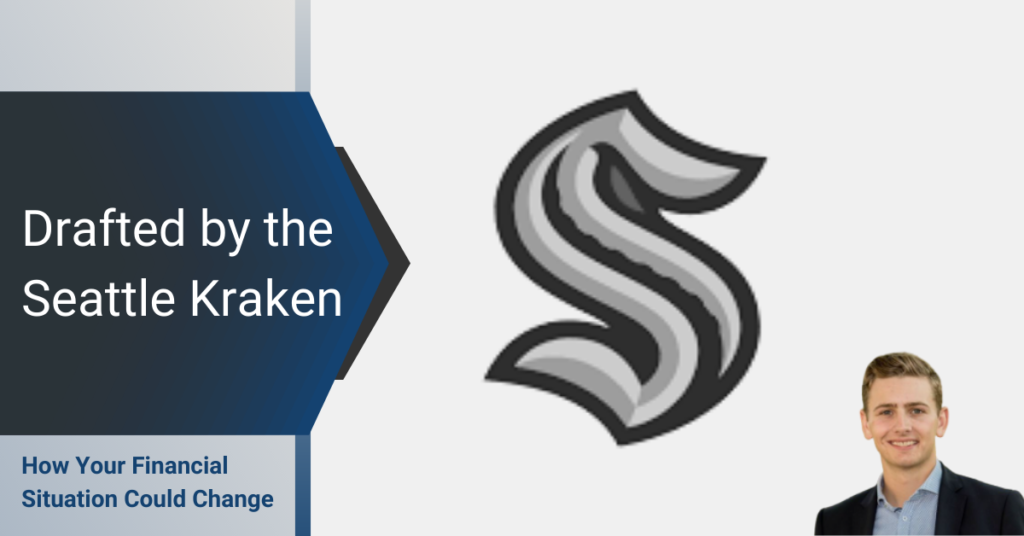[vc_row][vc_column][vc_column_text]
Drafted by the Seattle Kraken: How Your Financial Situation Could Change
The NHL has expanded to 32 teams by including the Seattle Kraken and will host an expansion draft in July. The rules are the same as they were when Vegas entered the league a few years ago, as per nhl.com.
As with the annual trade deadline, an expansion draft can create worry for some players. Most notably, with the expansion draft, only a handful of players can be protected by their current teams, meaning there could be a lot of uncertainty heading into the offseason for many players and their families.
Relocation at some point in your career is a reality for most pro hockey players, and there can be some drastic differences in your financial situation from team to team. Things to consider are taxes, cost-of-living, and currency exchange.
As an illustration, let’s examine how a players’ financial situation could change if they’re currently playing with Toronto Maple Leafs and were to be drafted by the Seattle Kraken in July.
Taxes
These two cities will fall on the two extremes in the NHL concerning taxes once Seattle enters the league. Since NHL players earn such high incomes, the majority of what they earn will be taxed at the highest marginal tax rate wherever they play.
In Toronto, they’ll pay 53.53% on most of their income, whereas in Seattle, they’ll only pay 37%. The significant difference is that there is no state income tax in Washington, while in Toronto, players pay both federal and provincial income taxes.
Tax-Planning Considerations
Tax-planning can become a highly complex topic that requires consideration of individual players’ residency and citizenship, not simply whether they play in Toronto or Seattle. Consulting a tax professional for advice on your specific situation is necessary in this regard. In saying that, here are a few quick points to consider:
- There are registered investment accounts in Canada and the U.S. with many similarities.
- You pay taxes where you reside for tax purposes, which may or may not be where you play.
- The U.S. has an estate tax, Canada does not.
- In Canada, players can establish a Retirement Compensation Agreement with their team and defer a large portion of their income.
Depending on what planning has occurred with the player until this point in their career, a move from Toronto to Seattle may require some updated strategic planning to organize their finances.
Cost of Living
What you owe in taxes is one thing; how much your after-tax dollars can buy you is another essential thing to consider. According to livingcost.com, the cost of living in Seattle is 18% more expensive than in Toronto. They arrive at this conclusion by comparing all essential day-to-day expenses such as food, utilities, rent, etc. Of course, this isn’t a blanket statement as it can vary from player to player depending on spending habits, but on average, it costs more to live in Seattle than in Toronto.
Currency
Every player in the NHL is paid in U.S. dollars, even those who play for a Canadian team. Therefore, the player in Toronto would need to convert some of their income to Canadian dollars to purchase goods. This process has been advantageous for the player in Toronto over the past several years, thanks to the favorable exchange rates. However, currencies fluctuate over time and are extremely difficult to predict and plan for.
*At the time of writing this article, the Canadian dollar has appreciated over the past few months and has made the currency exchange less favorable for the players in Toronto.
Summary
Where you play can undoubtedly affect your financial situation. In the example, we compared a Canadian city and an American city, which accentuates those potential differences.
In general, because players often spend time in multiple cities throughout their careers due to trades and free agency, or the rare expansion draft, it’s important to understand that your financial situation can be affected by this, plan accordingly, and be prepared to make changes when necessary.
As always, if you’d like to discuss your personal situation, give me a call at 204-223-2166 or send me an email at ahenry@harbourfrontwealth.com.
Sources:
https://www.taxtips.ca/taxrates/on.htm
https://oilersnation.com/2018/07/10/comparing-nhl-player-contracts-based-on-city/
https://livingcost.org/cost/seattle/toronto
https://www.moodystax.com/tax-in-canada-and-the-us-the-differences-that-really-matter/
Investopedia: Difference Retiring Canada vs America
[/vc_column_text][/vc_column][/vc_row]




